How online teams work: The Hybrid MBA experience
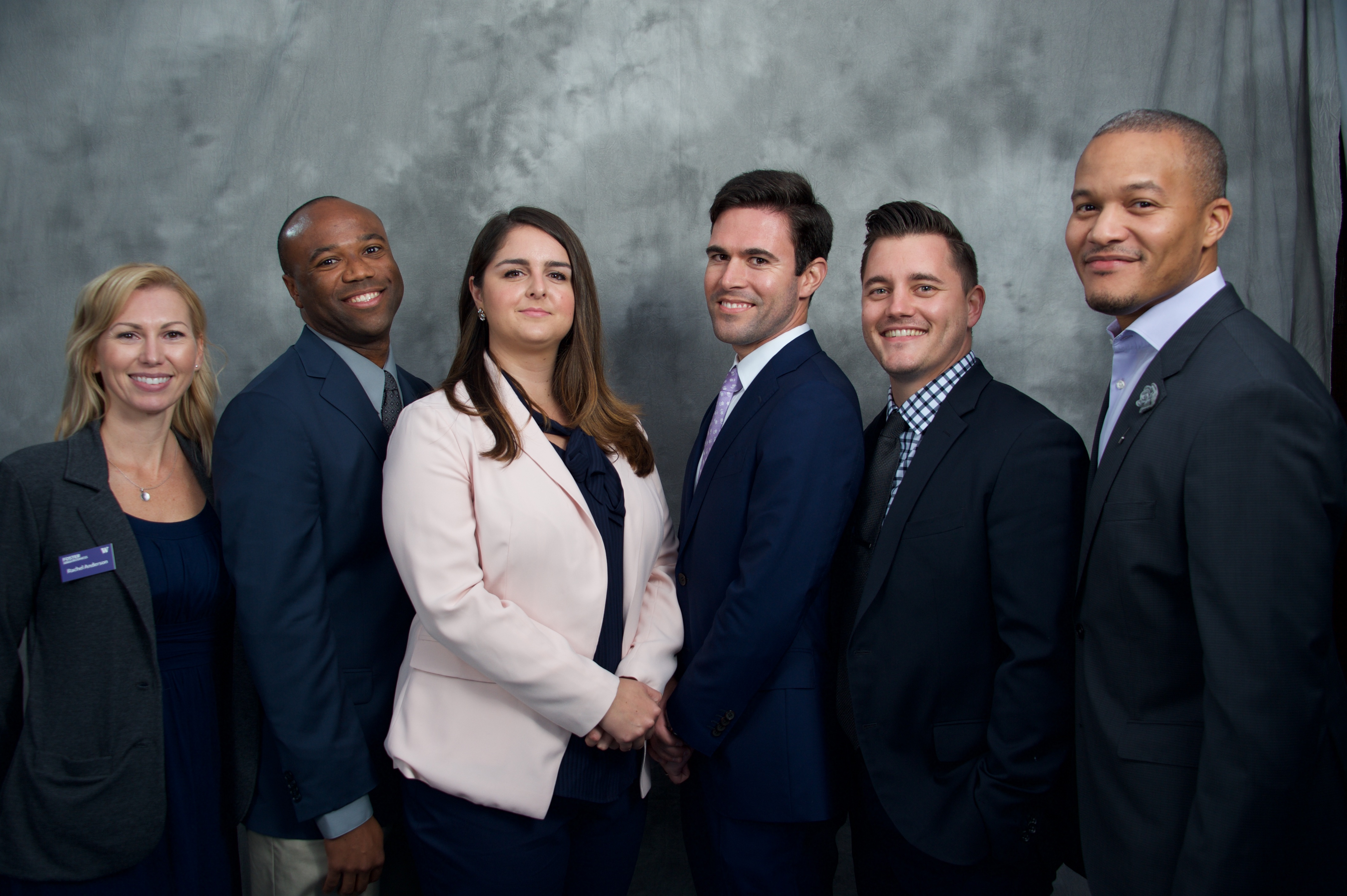
Team Blue from left to right: Rachel Anderson, Richard Johnson, Gabrielle Evans, Josh Satterfield, Matt Shaw, and Omari Miller
A major component of the MBA curriculum is helping students build the skills necessary to be an effective collaborator and leader. However, unlike most MBA programs, 95% of Foster’s Hybrid MBA program is online. This means that the vast majority of learning and collaboration occurs virtually—team work being no exception. As part of the Hybrid MBA program, every student is assessed and assigned to a study team (In 2018 the teams were: Team Blue, Team Brown, Team Green, Team Orange, Team Purple, Team Red, Team White, and Team Yellow) at the beginning of their first quarter. With the end of Winter Quarter on the horizon, we’re checking in with one of the teams (Team Blue) to see how they divvy up the assignments, keep each other accountable, and get to know each other despite having thousands of miles between them.
Meet Team Blue
- Rachel Anderson is a Consultant at BBC Advisors, LLC and is based in Los Angeles, CA.
- Gabrielle Evans is a Marketing Manager at Starbucks and is based in Seattle, WA.
- Richard Johnson is a Production Pilot at The Boeing Company and is based in Seattle, WA.
- Omari Miller is the Director of Business Development at a marketing agency in Seattle, WA.
- Josh Satterfield is the Senior Legislative Assistant and Press Secretary at the United States House of Representatives in Washington, D.C.
- Matt Shaw is the Operations Manager at Kaspars Catering and Special Events and is based in Seattle, WA.
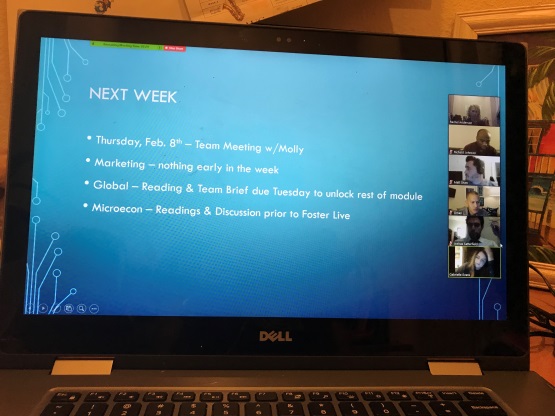
Team Blue working together online. Photo taken by Rachel.
What are your team logistics like?
Matt Shaw: We meet as a team once a week, on Tuesdays right after our Foster Live session.* Assignments are a mix of individual and team-based. This quarter (Winter 2018), many more assignments have been team-based and vary from discussion posts and reflections, essay responses, and in-depth case studies.
In our team, we break up the work based on the deadline of the assignment. For an assignment with a quicker turn-around, a team member will take ownership of the assignment and submit a rough draft on Canvas 48-hours before the assignment is due. The rest of the group then can make feedback and create a dialogue. The person owning the document then edits the document and submits. For longer and more complex team assignments we will usually create two groups of three and divide the work between those two sub-groups. Each sub-group has a leader who creates a document with their half of the work, and the greater team has a leader who compiles all the information from both groups and submits the final assignment.
*Foster Live is a 60-90 minute interactive session with Foster faculty and Hybrid classmates. Foster Live occurs every Tuesday evening.
Did you have any fears about the teamwork component of the Hybrid MBA Program?
Rachel Anderson: Very much so. It’s scary tying your grade and learning to a group of people you’ve never met before. [However] The Foster recruiting team did an amazing job of putting us in cohorts. Everyone in our group is very likeminded and we became an instant family. We very quickly found we could rely on each other. We’re all in this together. When things get crazy for me, I completely can count on my team to keep group assignments moving and to submit quality work. I’m a bit of a control freak, so that’s huge for me!
Omari Miller: “Fear” is a bit strong of a word, but I was certainly concerned about it. I understood that teaming would be a major part of the experience and that my new team members would be so critical to what I got out of this hugely significant investment of time and resource… for two years, no less. In my other post-graduate experience, I had enjoyed the latitude to choose study partners or none at all. In this case, we were assigned to Team Blue. But, whoever managed these team assignments for the program should really consider matchmaking as a cottage industry. They really did a wonderful job. It’s been my experience that the team got on quickly and was working well fairly straight-away. It was also extremely helpful that one of the courses of the first quarter of the program is about building productive teams.
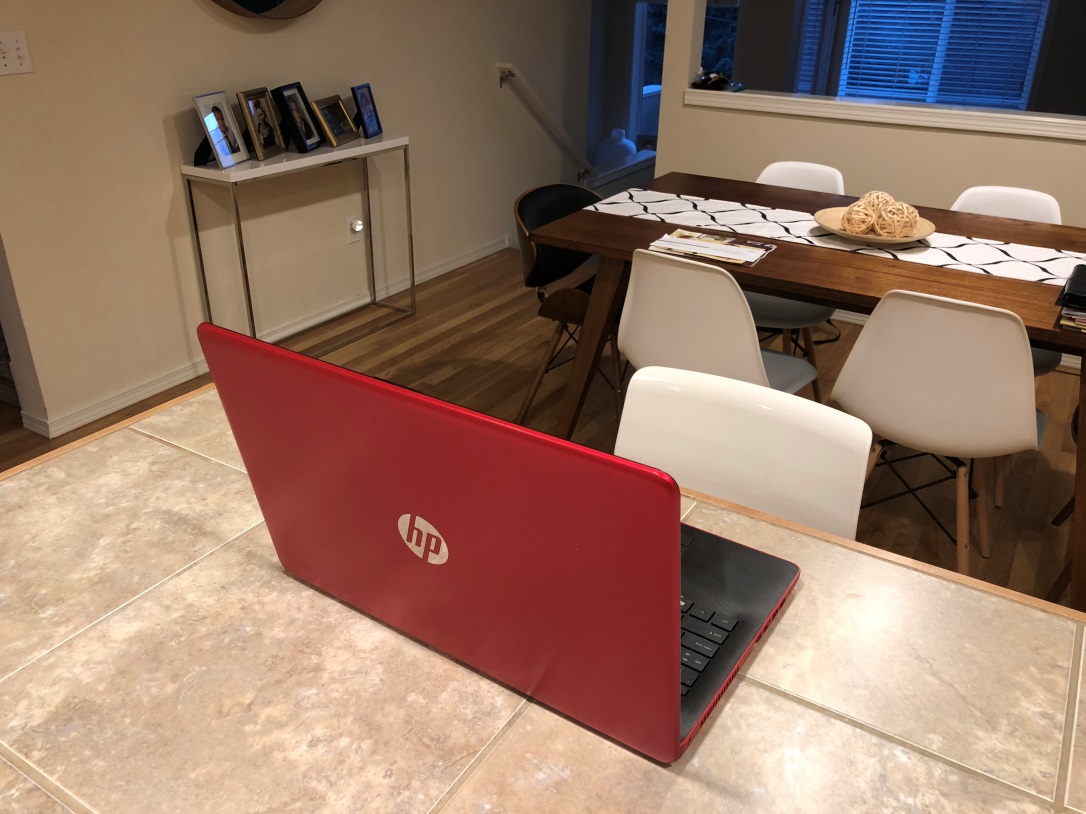
Omari’s work space
What is the team experience like in a hybrid format?
Richard Johnson: The hybrid format is an immersive journey that stitches together various skills essential to interpreting the complexities of the business world and the interpersonal skills needed to lead others through it. The flexibility of the course delivery does not diminish the substantial effort required to grasp the concepts. The format draws a wider variety of students from which the class benefits. By including an in-person element and establishing a team that will remain together for the entire program, many of the barriers to connecting with others online are removed. We are able to more naturally establish working relationships that carry through to the out-of-the-classroom work.
What’s it like working with people from different industries and backgrounds?
Richard Johnson: One of the things I like about our MBA team is that it lets us learn about interacting with people from different backgrounds and skill sets. Often, in our own industries, interactions are affected by sharing a common knowledge or experience with the subject or field we are in. In the broader business world, it is essential for leaders to be able to effectively connect with and motivate individuals that do not share the leader’s life experiences. Having the Blue Team that can openly and honestly share the challenges and successes of working with people in their industries as well as working with each other provides a real-life laboratory of sorts to exercise the communication and organization skills we need in our current and future pursuits
Josh Satterfield: The fact that our team represents diverse backgrounds and industries has enhanced my learning experience. We each approach projects and assignments with different perspectives and bring our own expertise and thought process to the table. Ultimately, this leads to stronger products and meaningful learning experiences.
Have you had to rely on your team members for support?
Gabrielle Evans: Yes! I work a full time job at Starbucks Corporate here in Seattle. I’m also a small business owner and I commute for 3+ hours every day on Washington State Ferries. I like to joke that I’m getting my MBA on the ferry because that time before and after work is incredibly valuable and allows me to focus on school during a stress-free commute. Given where I live and the demands of my professional life, the HMBA program has made it possible for me to get an MBA from the Foster School of Business at UW (my dream school!). Because all of us are so busy we do rely heavily on each other for support. For example, every Friday we send an email to the group called Feeling Friday and that’s where we touch base on how each of us is doing: does someone have a busy weekend coming up? Or a job interview? How can we support each other and reshuffle tasks if needed? I wouldn’t be where I am in the program if it weren’t for my team and the support they provide daily.
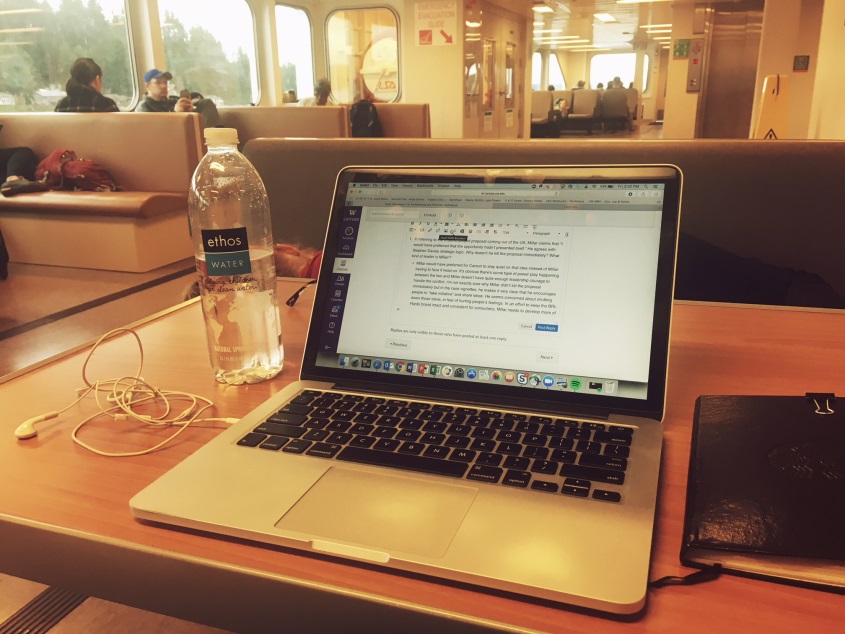
Gabrielle working on a ferry
Do you feel bonded as a team, despite being sprinkled across the country?
Josh Satterfield: In spite of the physical distance between us, I do feel like we’ve developed a solid bond. We attend class together online and have hour-long team meetings afterward. We also provide personal weekly recaps to our teammates every Friday and work on projects together throughout each week. Essentially, we’re hearing something from someone on the team every day we’re “in school”. So when we see each other in person at immersion sessions, we don’t really feel like it’s been a few months.
What are some quirks you’ve learned about your team members? Have you learned any quirks about yourself?
Rachel Anderson: The professional development classes we’ve taken have given me amazing insight into myself and my team members. We did a behavioral class where we were classified as different colors. It really makes it easier to communicate knowing where everyone is coming from.
Matt Shaw: I’ve honestly learned too many quirks too list here! The Foster admissions team did an amazing job of finding dynamic individuals with great backgrounds and leadership potential and learning about them has taught me a lot about myself as an individual.
At the beginning of the program you and your teammates drafted a team charter, a contract detailing your expectations for working with one another. What do you see as being the most important part of your team charter and how has it played out so far?
Rachel Anderson: Developing our team charter was a HUGE step in creating a bonded feeling. Based on our charter, we include everyone in all communications, we have virtual close out cocktails in our last team meeting of the month, we start every team meeting with a random icebreaker question, and, my favorite, we have Feeling Friday, where we shoot out quick emails to each other recapping our weeks (personally, professionally – whatever comes up). I look forward to sharing my news with the team and I’m genuinely excited to see what they’ve been up to. Sitting down and laying out expectations and what we want to get out of the program really set us off on the right foot.
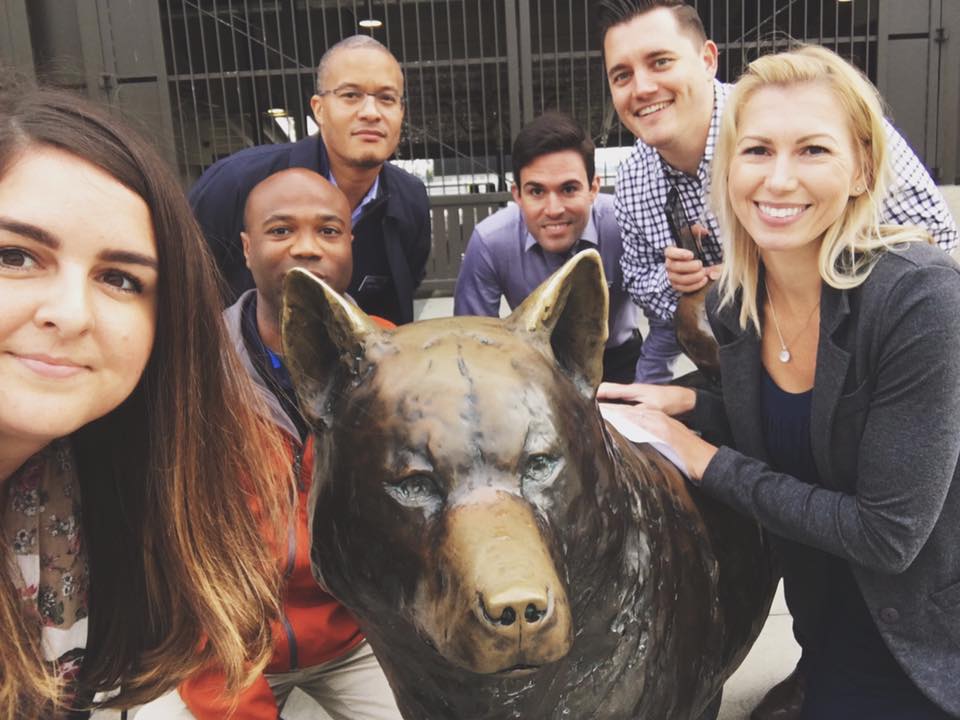
Team Blue on a scavenger hunt during their first on-campus immersion
Learn more about Foster’s Hybrid MBA program:
Published 03.01.2018
Updated 07.21.2021
